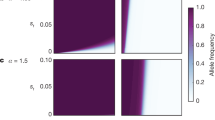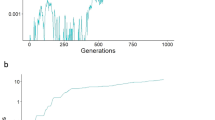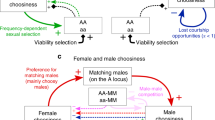Abstract
The objection is often raised against sociobiological theory that different behavioural strategies have never been shown to be genetically determined. Yet if they are to evolve at all, the differences must be in part hereditary. Nobody would dispute that many aspects of behaviour—the song of Drosophila or birds, or the tendency to migrate, for example—would show genetic variation. But sociobiologists assert that different strategies of behaviour— the alternative courses of action that an animal might take—are also inherited and can thus be selected: strategies for example, such as whether to be a ‘hawk’ or a ‘dove’ in conflicts, or whether to choose one type of male because he may be a better mate than others. No doubt there are many aspects of behaviour that vary genetically and thus produce variations in the chances of success in conflicts or in finding mates. But does an animal prefer to follow one course of action rather than other alternative courses, and is its preference hereditary? This is the crucial question for sociobiology. As dogmatically as some sociobiologists have answered ‘Yes’, so have some population geneticists anwered ‘No’. Lewontin1 called Dawkins' The Selfish Gene2 a caricature of Darwinism for assuming that all behaviour may be inherited and natural selection can therefore do anything. These extreme views persist for lack of experimental evidence. We show here that female mating preference can be substantially increased in successive generations by artificial selection. It must therefore have a genetic component.
This is a preview of subscription content, access via your institution
Access options
Subscribe to this journal
Receive 51 print issues and online access
$199.00 per year
only $3.90 per issue
Buy this article
- Purchase on Springer Link
- Instant access to full article PDF
Prices may be subject to local taxes which are calculated during checkout
Similar content being viewed by others
References
Lewontin, R. C. Nature 266, 283–284 (1977).
Dawkins, R. The Selfish Gene (Clarendon, Oxford, 1976).
Darwin, C. The Descent of Man and Selection in Relation to Sex (Murray, London, 1871).
Fisher, R. A. The Genetical Theory of Natural Selection (Clarendon, Oxford, 1930).
O'Donald, P. Heredity 22, 499–518 (1967).
O'Donald, P. Genetic Models of Sexual Selection (Cambridge University Press, 1980).
Lande, R. Proc. natn. Acad. Sci. U.S.A. 78, 3721–3725 (1981).
Muggleton, J. Heredity 42, 57–65 (1979).
Muggleton, J. & O'Donald, P. Heredity 43, 143–148 (1979).
Majerus, M. E. N., O'Donald, P. & Weir, J. Heredity 49, 37–49 (1982).
Lus, J. J. Trudy Lab. Genet. 9, 135–162 (1932).
Karlin, S. & O'Donald, P. Heredity 41, 165–174 (1978).
O'Donald, P. Heredity 44, 309–320 (1980).
O'Donald, P. Nature 272, 189 (1978).
Author information
Authors and Affiliations
Rights and permissions
About this article
Cite this article
Majerus, M., O'Donald, P. & Weir, J. Female mating preference is genetic. Nature 300, 521–523 (1982). https://doi.org/10.1038/300521a0
Received:
Accepted:
Issue Date:
DOI: https://doi.org/10.1038/300521a0
This article is cited by
-
Multimodal signal interactions in the ladybeetle, Hippodamia convergens, aposematic system
Chemoecology (2015)
-
Phenotype-dependent mate choice in Propylea dissecta and its fitness consequences
Journal of Ethology (2014)
-
Dissecting the complex genetic basis of mate choice
Nature Reviews Genetics (2006)
-
A study of nonrandom mating in a British population of the two-spot ladybird with a high frequency of the melanic morph
Journal of Insect Behavior (1996)
-
Nonrandom mating in the two-spot ladybird (Adalia bipunctata): The influence of weight on mating success
Behavior Genetics (1995)
Comments
By submitting a comment you agree to abide by our Terms and Community Guidelines. If you find something abusive or that does not comply with our terms or guidelines please flag it as inappropriate.



